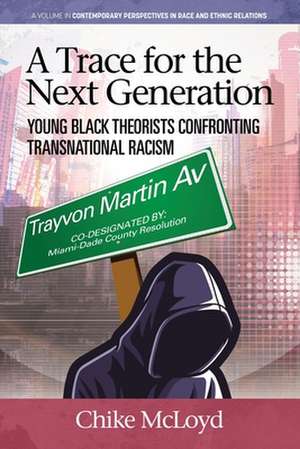A Trace for the Next Generation: Contemporary Perspectives in Race and Ethnic Relations
Autor Chike McLoyden Limba Engleză Paperback – 10 noi 2021
| Toate formatele și edițiile | Preț | Express |
|---|---|---|
| Paperback (1) | 384.94 lei 6-8 săpt. | |
| Information Age Publishing – 10 noi 2021 | 384.94 lei 6-8 săpt. | |
| Hardback (1) | 582.37 lei 6-8 săpt. | |
| Information Age Publishing – 10 noi 2021 | 582.37 lei 6-8 săpt. |
Preț: 384.94 lei
Nou
Puncte Express: 577
Preț estimativ în valută:
73.66€ • 77.11$ • 60.95£
73.66€ • 77.11$ • 60.95£
Carte tipărită la comandă
Livrare economică 05-19 aprilie
Preluare comenzi: 021 569.72.76
Specificații
ISBN-13: 9781648025938
ISBN-10: 1648025935
Pagini: 166
Dimensiuni: 156 x 234 x 9 mm
Greutate: 0.24 kg
Editura: Information Age Publishing
Colecția Contemporary Perspectives in Race and Ethnic Relations
Seria Contemporary Perspectives in Race and Ethnic Relations
ISBN-10: 1648025935
Pagini: 166
Dimensiuni: 156 x 234 x 9 mm
Greutate: 0.24 kg
Editura: Information Age Publishing
Colecția Contemporary Perspectives in Race and Ethnic Relations
Seria Contemporary Perspectives in Race and Ethnic Relations
Descriere
Based on eighteen months of ethnographic research in a high school E.L.L. classroom, this study contributes to the fields of new literacies studies and critical pedagogy by showing how transnational Black youth theorize and negotiate intersections of racism, justice, and education. Drawing on a multidimensional approach for understanding how racism is reproduced and resisted across various domains of power, the author shows how two young men from Haiti theorize the U.N. and INGO occupation of post-earthquake Haiti; a disjuncture between how Africa and Haiti are (mis)known in the U.S. and students' lived realities in their respective countries of origin; and finally, students' analysis of structural racism in the U.S. through a Justice for Trayvon unit that was co-taught from March-May 2012, when Trayvon Martin, George Zimmerman, and Stand Your Ground became household names.The author concludes by suggesting that we move toward a "lessons against white supremacies" framework for critical pedagogy. This framework draws on centering counter-narratives and thinking through the notion of decolonial love to reframe everyday classroom praxis. Culturally informed, antiracist pedagogies must begin with students' theoretical work and experiential knowledge. Such an approach transforms classrooms into spaces for students to not only interrogate racism but also create (counter) texts that represent their subjectivities as young Black people in the 21st century.

